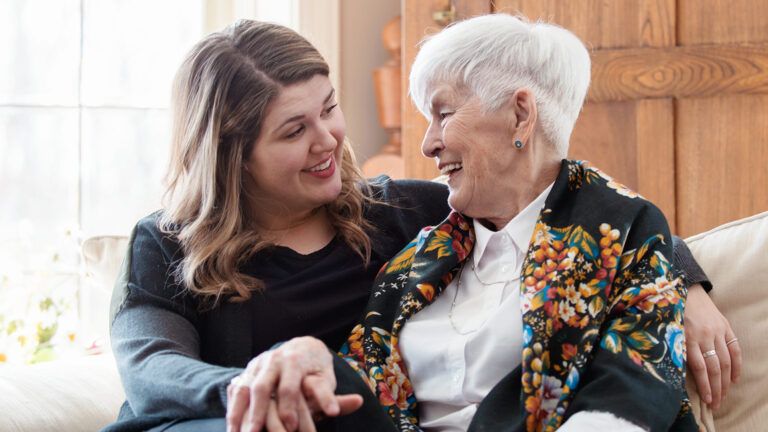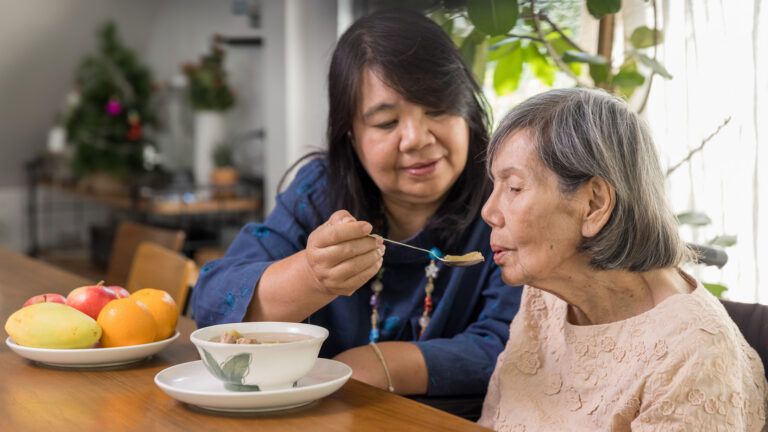In ideal circumstances, Mother’s Day is a time to be with your mom as you celebrate all that she means to you. Of course, this is not always possible. You may be caregiving for her from afar, either because you live in another locale or because you’re required to maintain a social distance. It may also be that, as your mother’s family caregiver, you are able to spend the day with her in your home, yet you feel a sense of “ambiguous grief” as you approach this annual marker. If your mother has memory issues as a result of dementia, you may be experiencing the loss of the person you have always known, even though she’s physically present.
“There are cycles in our lives, and Mother’s Day is certainly a cycle where you’re looking at this person and your relationship with them,” Megan Carnarius, R.N., of Memory Care Consulting, told Guideposts.org. “There can be a sense of great loss, and a feeling of this was my best friend, the person who raised me and mentored me, and so how can I turn toward this person now in a way that’s helping at this phase?” The important thing to keep in mind with dementia is that people have differing needs at various stages, said Carnarius, who also authored the book A Deeper Perspective on Alzheimer’s and Other Dementias: Practical Tools with Spiritual Insights.
Whether you have to be physically separated from your mom on Mother’s Day, or whether the sense of separation is due to the mental and emotional effects of dementia, there are opportunities to connect in good ways, Carnarius said. If your mother lives alone, she said, she hopefully has an in-home caregiver or a care manager who can call her regularly to check in and evaluate her needs. Even though you may be reluctant to have someone you don’t know help with your mother’s care, keep in mind that professional caregivers have the compassion and expertise to handle a wide variety of care needs that family members often are not able to.
Carnarius offered the following ideas to celebrate your mother on this important day:
1. Remind her of her accomplishments
If you can’t be in the same place, celebrate via FaceTime, Skype or Zoom, and try using a TV monitor. “If somebody is getting more advanced dementia and they’re struggling a little bit more with being distractible and having a short attention span, having the person bigger in the room helps that conversation be able to happen,” Carnarius said. “When people are in more of a middle stage, they tend to be more emotional and to start losing track of what were all the things that I accomplished?” Sending your mom videos in which you talk directly to her about what she’s achieved can also be reassuring. A professional in-home caregiver or another family member who may be present can help out if she’s having trouble with this technology.
2. Put her stories to photos
A photo album with labeled explanations can be a great Mother’s Day gift if you live far away or otherwise can’t be in the room with your mom. “When the caregiver is either a professional or a family member who might be sitting down with that person, the story’s already there,” Carnarius said.
3. Apologize and forgive
Use the day to communicate important feelings you may have. “Even if you are on the phone and the caregiver who is with the person is holding the phone to that person’s ear, apologize—maybe you did something as an adolescent that was super challenging to your mom,” Carnarius said. “Or forgive. Maybe your parents were suffering in a bad marriage and couldn’t get divorced until you were out of high school and you really wished they had gotten divorced earlier. Tell her, ‘It’s okay, I just want to tell you I love you, and I know you tried as hard as you could.’”
4. Open yourself to healing, if it’s needed
Try to let go of hurts and wounds from the past and focus on what’s happening right now. Dementia changes people in a variety of ways. While it can make them more angry or difficult, it can also be the case “that they’re not able to think about things that used to plague them,” Carnarius said. “The disease may be making this person really different, and I may have an opportunity to be in their presence or around them in a way that actually could be really sweet and could be healing.”
5. Renew your relationship with the whole person
Reflect on how to be a loving, calm presence with your mother, even if she is in the advanced stages of Alzheimer’s. Use Mother’s Day as a time to thank and praise her, and to tell her stories that have special meaning or that used to make her laugh. “Sometimes we think people’s brains are the definition of them,” Carnarius said. “But we’re so much more than our brains.”




